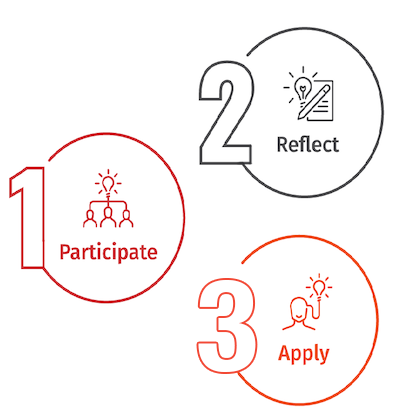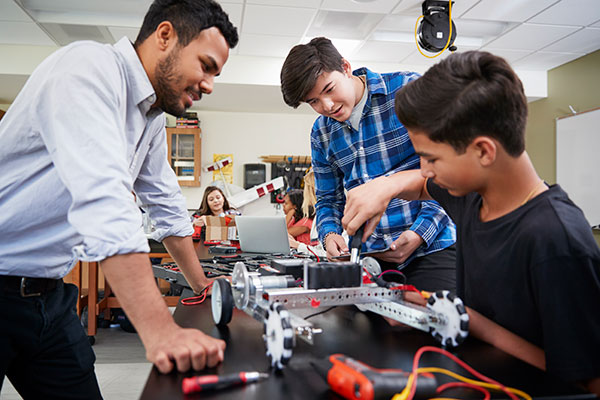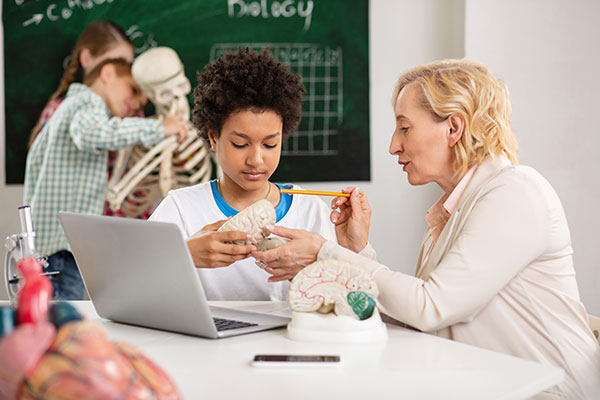Supporting New Brunswick’s Future Talent
Everyone benefits when New Brunswick youth have the skills, strategies, supports and resilience necessary to successfully pursue their preferred futures. The New Brunswick Department of Education and Early Childhood Development (EECD) is focused on systemically advancing the current design and delivery of career development K-12. Career development is the lifelong process of managing learning (formal and informal), work (paid and unpaid), and transitions in order to move toward one’s preferred future (Council of Atlantic Ministers of Education and Training, 2015). Specifically, EECD will continue to ensure effective transitioning for all, including learners with diverse needs.
Experiential Learning Overview

Experiential learning provides opportunities for all students to co-construct their learning by engaging in a three-stage learning cycle. During experiential learning, the student:
- participates in authentic experiences which align with school curricula.
- reflects before, during and after their learning experiences in order to derive meaning.
- applies what they have learned to help them make informed decisions, advance their knowledge and refine their skills.
- Video presentations
- Demonstrations
- Career and workplace ethics
- Virtual tours
- Mock interviews
- Industry mentors
- Site visits
- Industry tours
- Job shadowing
- Field work
- Mock interviews
- Civic engagement
- Presentations
- Case studies
- Panelists
- Project-based learning
- Problem-based learning
Community Connected Experiential Learning

Community Connected Experiential Learning (CCEL) is an effective approach to assist schools in addressing the complex needs associated with preparing students for a rapidly changing world. CCEL involves active student participation in authentic, community-based experiences, reflecting on these experiences, and applying their learning to their own lives. CCEL helps create direct connections between student learning and real-world environments, and problems or issues relevant to them. Community connected experiential learning opportunities help promote student engagement and motivation, while developing their capacity for resilience.
Student Benefits
- Provides youth with an opportunity for growth in their Global Competencies (GCs).
- Blends classroom learning with real-world experiences.
- Prepares students for possible future careers.
- Increases connection between academics and real-life application.
- Encourages students’ personal, professional, and civic development.
- Provides an avenue for students to understand themselves and the communities they live in.
Employer Benefits
- Provide youth with an opportunity to build and enhance their skills, perceptions, and work ethics.
- Expose students to careers and opportunities in their local communities and throughout New Brunswick.
- Bring community awareness to your business – New Brunswick opportunities get the spotlight!
- Work directly with members of the future workforce – students!
- Deliver your shared needs, visions, values, and philosophies to students and schools.
- Close potential gaps in the skills needed to work in your business and industry.
- Provide coaching opportunities for your employees to develop confidence in their own skills by becoming mentors for students.
Get Involved
Experiential Learning Coordinators
Experiential learning coordinators in each district connect teachers and students to experiential learning opportunities. They provide support in establishing connections to professionals in a variety of sectors and provide resources to support experiential learning, such as myBlueprint, and professional learning.
If you’d like to participate or require more information, we’d love to hear from you! Please contact: eecd@futurenewbrunswick.ca
Learn more about our programs:OVERVIEW COOP PROGRAMS
Centres of Excellence

A Center of Excellence (COE) is a space (online) which provides opportunities to reimagine how students, across K-12, learn about specific career, business, and industry sectors. By collaborating with numerous partners, the Department of Education and Early Childhood Development (EECD) seeks to invigorate sector specific education in the school system. This includes enriching the delivery of curriculum in many subject areas by sharing content based on authentic practices; facilitating opportunities for experiential learning; remotely connecting learners and experts; and exploring current issues. Current and future COEs are focused on Energy, Health, Digital Technology and Entrepreneurship.
Learn more about the Centres of Excellence here.
A COE will support the school system and partners in many ways:
| Access |
|
| Expertise |
|
| Personalization and Experiential Learning |
|
| Partnership |
|
Essential Skills Achievement Pathway
What is the Essential Skills Achievement Pathway in the Anglophone Sector?
The Essential Skills Achievement Pathway (ESAP) Program is an experiential, problem and project-based graduation pathway. This pathway prepares New Brunswick’s Anglophone youth for a preferred future which could include university, college, apprenticeship or the world of work.
The program consists of personalized learning opportunities that allow students to explore their skills, talents, abilities and interests while intentionally attaining the 9 Federal Essential Skills. Proficiency in these skills are demonstrated and evaluated through problem and project-based learning in the essential skills classroom, content specific courses, community experiential learning, and work place opportunities.
The experiential, problem, and project-based learning environments position the student at the center, while the teacher operates as a trusted mentor and guide on the side. This program helps prepare students for the current skills-based economy as well as future work, learning, and life.








